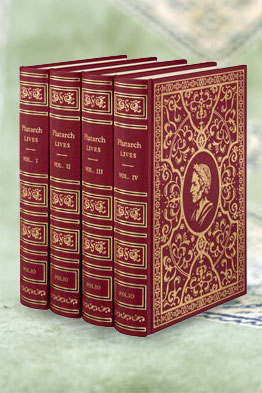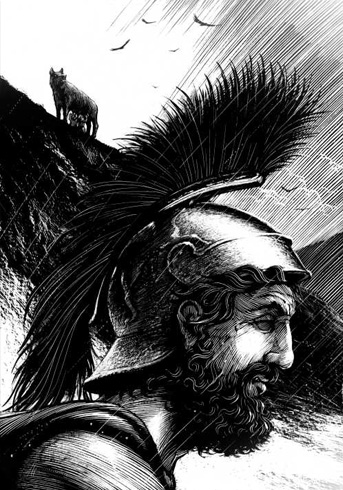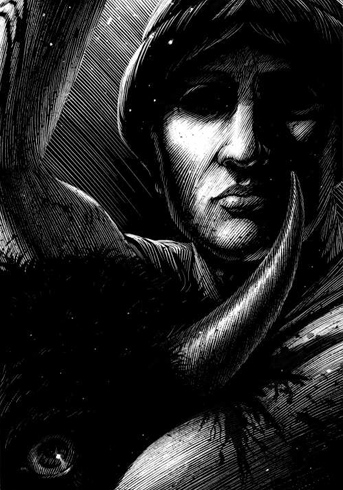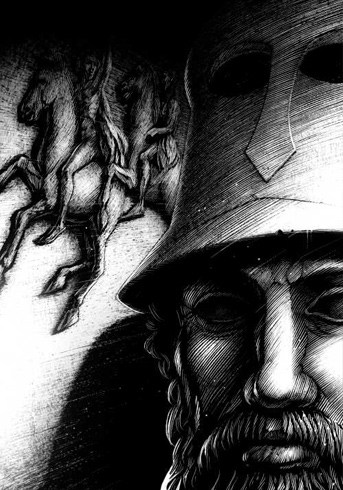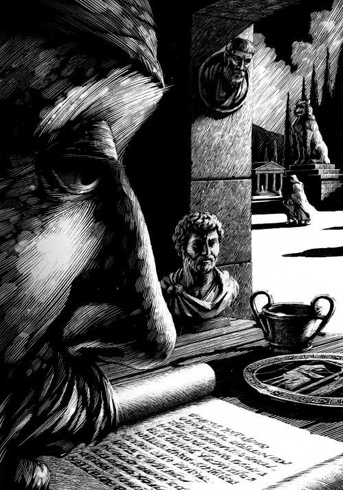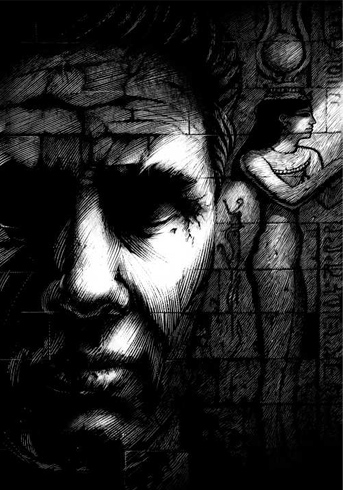Title: The Lives
Author: Lucius Mestrius Plutarchus, John Dryden (trans), David Rooney (illus), Tom Holland (intro)
ISBN: –
Publisher: The Folio Society, 2010
Condition: 4 volumes bound in buckram, new and perfect. Blocked with a design based on a 16th-century binding and incorporating individual portraits. Presented in a gold-blocked slipcase. Set in Dante. 2,408 pages in total. 33 full-page illustrations. Book Size: 10″ x 6¾”. Very heavy – shipping overseas is extra.
One of the most influential works of history ever written
Thomas Jefferson said that there were three books that every gentleman should have to hand: Livy’s History of Rome, the Aeneid and Plutarch’s Lives. Plutarch’s fascinating account of the lives of the greatest Greeks and Romans was one of the first major works of biography as we know it. It had an incalculable effect on Western culture, shaping the way we see the ancient world and influencing writers from Shakespeare to Emerson. This major new edition, in four volumes, is introduced by acclaimed historian Tom Holland, and is vividly enhanced by a series of original illustrations by award-winning artist David Rooney.
‘We have thought fit’, wrote Plutarch in his Life of Pericles, ‘to spend our times and pains in writing of the lives of famous persons.’ It was an audacious plan, particularly for a Greek citizen of Rome writing in the first century AD. Not only was the art of biography in its infancy, but Plutarch paired celebrated Greeks with Romans, pointing out parallels between them. Greeks were esteemed by the Romans for their art and philosophy, but were not seen as heroes, warriors or law-makers. Plutarch’s Greeks, however – Theseus, Pericles, Alexander – were no less heroic than the Romans. As introducer Tom Holland writes, this could have struck Roman readers as an exercise in conceited presumption, but the Romans loved the Lives, and their popularity proved instant and enduring.
‘We dunces would have been lost if this book had not raised us’
MICHEL DE MONTAIGNE
Plutarch begins his Lives with Theseus and Romulus, the legendary founders respectively of the Athenian state and Rome, and ends with Antony, Brutus and the other successors of Caesar. Together, his Lives form an enthralling history of Greco-Roman antiquity from the earliest times to the fall of the Roman Republic and the birth of the Empire. By focusing on the roles of the great men in history, Plutarch creates a narrative that is lively, personal and compelling. His gift is to seize on the details that illuminate character, and to sum up people and nations through vivid anecdote. He tells how the young Julius Caesar, kidnapped by pirates who asked for twenty talents as ransom, ‘laughed at them for not understanding the value of their prisoner, and voluntarily engaged to give them fifty’. We also learn how the Spartans bathed their children in wine to strengthen them, how the great orator Demosthenes overcame a stammer by speaking with pebbles in his mouth, and how the legislator Lycurgus defused the anger of a mob by inviting one of them to stay with him in his home. Plutarch’s portraits are balanced, and he is always ready to acknowledge his subjects’ less admirable qualities, whether the ‘drunkenness, debauchery and insolence’ of Alcibiades, or Mark Antony’s ‘insane desire to be the first and greatest man in the world’. This insight into human nature makes the Lives a timeless and fascinating history, as readable and relevant today as when it was first written.
‘Sometimes a matter of less moment, an expression or a jest,
informs us better of their character and inclinations, than the most
famous sieges, the greatest armaments, or the bloodiest battles’
Life of Alexander
‘‘He was always excessively pleased with his own praise,
and continued to the very last to be passionately fond
of glory; which often interfered with the prosecution of
his wisest resolutions’
Life of Cicero
It is impossible to exaggerate the influence of Plutarch’s Lives on our view of the ancient world. For centuries he was the main source of information about such figures as Alexander and Cleopatra. Shakespeare based the stories of his Roman plays almost entirely on the accounts in the Lives. Many passages in Antony and Cleopatra, most famously the description of Cleopatra on her barge, are taken almost word for word from Plutarch. Voltaire and Montaigne were ardent admirers, while the Founding Fathers of America drew on many examples from the Lives in their writings and letters. This new Folio Society edition uses the classic translation overseen by John Dryden. Each life is placed in chronological order, with the Greeks before the Romans, creating an enthralling narrative history of the ancient world.
‘A Bible for heroes’
RALPH WALDO EMERSON
The historian who shaped our view of the classical age
Lucius Mestrius Plutarchus was born in the Greek town of Chaeronea in AD 46, then part of the Roman Empire. He studied philosophy in Athens, travelled in Italy and the rest of the Empire, and was later a priest at Apollo’s shrine in Delphi. In Plutarch’s day, though Athens remained an intellectual centre, its heyday was long past and its status was that of a provincial city within the Roman Empire. Plutarch’s most celebrated work, the Lives, helped to reverse the trend of Greek decline by transforming the way that the Romans saw the Greeks, and vice versa. Nearly two thousand years later, it continues to shape the way we see the classical age.
Newly commissioned illustrations that bring the past alive
Award-winning Irish artist David Rooney created 33 black-and-white illustrations for this new edition. Rooney’s accolades include six awards from the Institute of Creative Advertising and Design and the Association of Illustrators Silver Medal. For Plutarch’s Lives, he has taken existing classical portraiture and re-imagined it: the result is an imposing and arresting series of line portraits, showing iconic faces together with the famous symbols associated with them. The frontispiece to each volume is a portrait of Plutarch himself, with the background varying in each.

